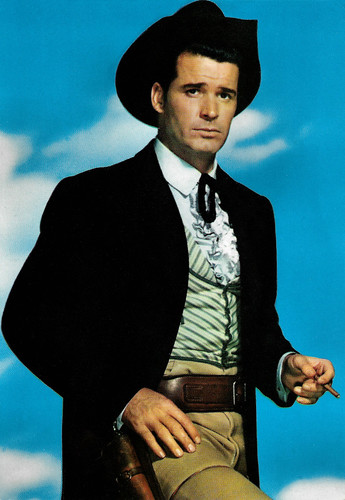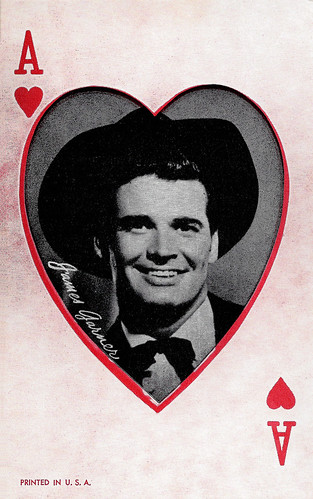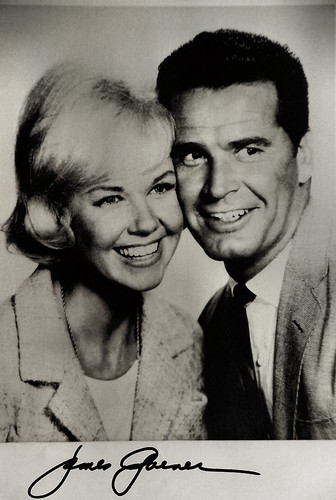
Spanish postcard by CyA, no. 22. Photo: Warner Bros. James Garner in the TV series Maverick (1957-1960).

British postcard by D. Constance Ltd., London, licence holder of Universum-Film A.G., Berlin-Tempelhof, no. 102. Photo: Reisfeld / Ufa.
Maverick
James Garner was born James Scott Bumgarner in Norman, Oklahoma, in 1928. He was the youngest of the three sons of Weldon Warren Bumgarner and Mildred Meek. He was orphaned at the age of four by the death of his mother. Thereafter he and his brothers lived initially with their grandmother. After his father married his second wife, Wilma, the children returned to him.
James hated his stepmother who beat all three boys, especially him. He said that his stepmother also punished him by forcing him to wear a dress in public. At the age of 14, an argument with her led to a fight. He knocked her down and choked her to keep her from killing him in retaliation. She left the family and never returned. His father moved to Los Angeles, leaving Garner and his brothers in Norman. Garner's last stepmother was Grace, whom he said he loved and called "Mama Grace", and he felt that she was more of a mother to him than anyone else had been.
He began working in the merchant marine when he was 16 years old near the end of World War II. After the war, Garner joined his father in Los Angeles and enrolled at Hollywood High School, where he was voted the most popular student. Garner enlisted in the California Army National Guard, serving his first 7 months in California. Then, during the Korean War, he went to Korea for 14 months as a rifleman in the 5th Regimental Combat Team participated. In the Korean War, he was wounded twice and Garner was awarded the Purple Heart for his wounds.
When he returned, he began studying business administration but then transferred to the Berghof School in New York for acting training. He scraped by with odd jobs until he got a gig in a Broadway production in 1954. That year he also appeared for the first time as an extra in The Caine Mutiny (Edward Dmytryk, 1954), the film version of Herman Wouk's stage play starring Humphrey Bogart. After that, he took on smaller roles in film and television.
He became known to a wider audience with the role of professional gambler Bret Maverick in the Western TV series Maverick (1957-1960). In the cinema, he appeared in such films as Sayonara (Joshua Logan, 1957) with Marlon Brando, and the war film Darby's Rangers (William Wellman, 1958). After his acrimonious departure from Warner Bros. in 1960, Garner briefly found himself graylisted by Warner until director William Wyler hired him for a starring role in The Children's Hour (1961) with Audrey Hepburn and Shirley MacLaine, a drama about two teachers surviving scandal started by a student.

American Arcade card. Photo: James Garner in Maverick (1957–1960).

Autograph card. James Garner and Doris Day in Move Over, Darling (Norman Jewison, 1963).
The Great Escape
In the early 1960s, James Garner abruptly became one of the busiest leading men in cinema. In Boys' Night Out (Michael Gordon. 1962) with Kim Novak and Tony Randall, and The Thrill of It All (Norman Jewison, 1963) with Doris Day, he returned to comedy.
Garner also starred opposite Day in Move Over, Darling (Michael Gordon, 1963), a remake of the screwball comedy My Favorite Wife (Leo McCarey, 1940) in which Garner portrayed the role originally played by Cary Grant. The remake had begun as Something's Got to Give but was recast and retitled after Marilyn Monroe died and Dean Martin chose to withdraw as a result.
Next came the war dramas The Great Escape (John Sturges, 1963), Paddy Chayefsky's The Americanization of Emily (Arthur Hiller, 1964) with Julie Andrews, and Roald Dahl's 36 Hours (George Seaton, 1965) with Eva Marie Saint. In the smash hit The Great Escape, Garner played the second lead for the only time during the decade, supporting Steve McQueen among a cast of British and American screen veterans in a story depicting a mass escape from a German prisoner of war camp based on a true story. The film was released in the same month as The Thrill Of It All, giving Garner two films at the box office simultaneously.
James Garner also starred in Westerns such as Duel at Diablo (Ralph Nelson, 1966) with Sidney Poitier, Hour of the Gun (John Sturges, 1967) with Garner as Wyatt Earp and Jason Robards Jr. as Doc Holliday, and Support Your Local Sheriff! (Burt Kennedy, 1969) with Walter Brennan. He owned his own production company, which financed some of his film projects. Garner was fascinated by car racing. His own racing experience made him ideally qualified to portray a racing driver in Grand Prix (John Frankenheimer, 1966). After this film, he co-owned the racing team "American International Racers" (AIR) for two years and took part in the documentary film The Racing Scene (Andy Sidaris, 1969).
His greatest popularity, however, came from playing the title role in the television series The Rockford Files (1974- 1980), for which he received an Emmy Award for Best Actor in 1977. In the 1990s, Rockford episodes were made in feature film format, quoting the style of the 1970s episodes. Garner and Jack Kelly reappeared as Bret and Bart Maverick in a made-for-television film titled The New Maverick (Hy Averback, 1978) written by Juanita Bartlett, and in the series Bret Maverick (1981-1982).

Israelian postcard by Editions De Luxe, no. 132.
Victor/Victoria
James Garner gave one of his greatest comedic performances as the lover of a (fe)male female impersonator in the highly enjoyable musical comedy Victor/Victoria (Blake Edwards, 1982) starring Julie Andrews. The film, an entertaining remake of the German film Victor und Victoria/Victor and Victoria (Reinhold Schünzel, 1933), was nominated for seven Academy Awards and won the Academy Award for Best Original Score. In 1995, it was adapted as a Broadway musical. Victor/Victoria
Garner received an Academy Award nomination for Murphy's Romance (Martin Ritt, 1985) with Sally Field. Garner played Wyatt Earp again in Blake Edwards' Western Sunset (1988), starring Bruce Willis. In the film Maverick (Richard Donner, 1994), Garner takes on the role of the marshal who turns out to be Bret's father in the course of the film. Bret Maverick was portrayed in the film by Mel Gibson.
Garner's career and popularity continued through another decade in films such as Space Cowboys (Clint Eastwood, 2000) with Clint Eastwood, Tommy Lee Jones and Donald Sutherland, the animated film Atlantis: The Lost Empire (Gary Trousdale, Kirk Wise, 2001) (voice work) with Michael J. Fox and The Notebook (Nick Cassavetes, 2004) with Ryan Gosling and Gena Rowlands.
On television, he could be seen as Cate's father Jim Egan in the Sitcom 8 Simple Rules (2003–2005) starring Katey Sagal. He suffered a mild stroke in 2008, after which he appeared only as a voice actor in various film projects. In 2011, Simon & Schuster published Garner's autobiography 'The Garner Files: A Memoir'. In addition to recounting his career, the memoir, co-written with nonfiction writer Jon Winokur, detailed the childhood abuses Garner suffered at the hands of his stepmother. It also offered frank, unflattering assessments of some of Garner's co-stars such as Steve McQueen and Charles Bronson. In addition to recalling the genesis of most of Garner's hit films and television shows, the book also featured a section where the star provided individual critiques for every one of his acting projects accompanied by a star rating for each.
James Garner succumbed to a heart attack in Los Angeles in 2014 at the age of 86. Since 1956 he was married to Lois Clarke, who brought their daughter Kimberley into the marriage. The couple last lived most of their time away from Hollywood on Garner's ranch near Santa Barbara. His biological daughter Greta 'Gigi' was a successful singer in Britain in the 1980s. For his contribution to the film and television industry, Garner received a star on the Hollywood Walk of Fame at 6927 Hollywood Boulevard.

American card by Universal Pictures Company, Inc. / Ross Hunter Productions, Inc., 1965. Photo: Universal. James Garner in The Art of Love (Norman Jewison, 1965).

Vintage card. Photo: M.G.M.
Sources: Wikipedia (Dutch, German and English) and IMDb.
He could indeed play both comedy and drama. We especially enjoyed him in THE GREAT ESCAPE and Viktor/Victoria. Thank you for posting.
ReplyDeleteThanks, Maria! He was such a surprise as King Marchand in Victor/Victoria. Really wonderful.
ReplyDelete